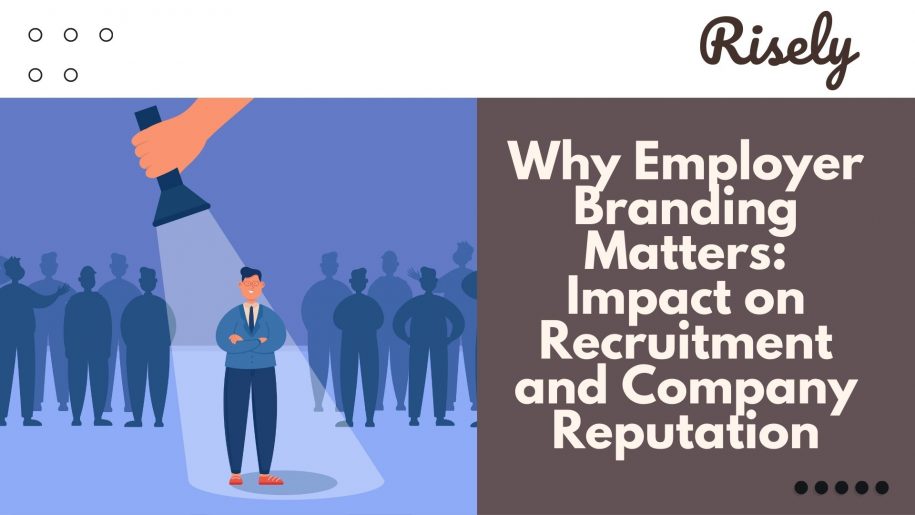Why Employer Branding Matters: Impact on Recruitment and Company Reputation
Attracting and retaining top talent is more crucial than ever for managers striving to stay ahead of the competition. Amidst a sea of opportunities, how can companies become the employer of choice for the brightest minds and the most skilled professionals? In this blog on “Employer Branding” – a transformative concept that shapes the organization’s perception as employers in the eyes of current and potential employees. We will explore the significance of employer branding, the benefits it offers, and the strategic approaches that can elevate your workforce to unparalleled heights.What is employer branding?
Employer branding refers to the reputation and image that an organization cultivates as an employer in the eyes of current and potential employees. It encompasses the company’s values, culture, work environment, benefits, and overall employee experience. Just like branding is essential for a product or service, employer branding is crucial for attracting and retaining top talent. A strong employer brand can differentiate an organization from its competitors in the job market, making it more appealing to potential candidates. It also helps attract candidates who align with the company’s values and are more likely to be engaged and committed to their work.Why does employer branding matter?
Employer branding matters for several key reasons:- Attracting top talent: In a competitive job market, a strong employer brand can help attract high-quality candidates eager to work for a reputable and desirable organization.
- Reducing recruitment costs: A company with a positive employer brand can significantly reduce recruitment costs as candidates are more likely to seek out and apply for job opportunities with the organization proactively.
- Employee retention: A positive employer brand enhances employee satisfaction and engagement, leading to higher retention rates and reduced turnover.
- Enhancing company reputation: A strong employer brand contributes to a positive perception of the company, not just among potential employees but also customers, suppliers, and other stakeholders.
- Increasing employee advocacy: Satisfied and engaged employees are more likely to be brand advocates, promoting the organization as a great workplace through word-of-mouth and social media.
Other Interesting Reads
How can managers improve employee branding through training and development?
Managers are crucial in improving employer branding through training and development initiatives. By actively participating in and supporting these programs, managers can create a positive and engaging work environment that enhances the organization’s reputation as an employer of choice. Here’s how managers can contribute to employee branding through training and development:- Identifying training needs: Managers are in a prime position to identify the training needs of their teams. By regularly assessing employee skills and performance gaps, they can determine the specific training programs required to enhance individual and team capabilities.
- Supporting employee development plans: Managers should actively collaborate with employees to create personalized development plans. Managers demonstrate their commitment to employee growth and success by aligning training opportunities with their career goals and aspirations.
- Promoting a learning culture: Managers should encourage continuous learning within their teams. Managers reinforce the importance of growth and improvement by fostering an environment where employees feel empowered to seek out training and development opportunities.
- Leading by example: Managers should participate in training programs and lead by example. When employees see their managers investing in their development, it inspires them to follow suit and take advantage of training opportunities.
- Providing ongoing feedback: After training sessions, managers should provide constructive feedback to employees to reinforce the value of learning and development. Positive feedback and encouragement can boost employees’ confidence and motivation to apply their new skills.
- Tying training to performance reviews: Incorporate training and development achievements as part of performance reviews. Recognizing employees’ commitment to growth and improvement during evaluations reinforces the organization’s emphasis on continuous learning.
- Encouraging skill application: Managers should create opportunities for employees to apply their newly acquired skills in real work scenarios. This reinforces the training and provides employees with a sense of accomplishment and relevance.
- Measuring training impact: Managers can collaborate with HR and L&D teams to measure the impact of training initiatives. Collecting data on employee performance improvements and skill advancements helps demonstrate the tangible benefits of training to the organization.
- Supporting employee well-being: Employee well-being is closely linked to employer branding. Managers should ensure that the training and development process considers employees’ work-life balance and supports their well-being.
- Encouraging employee advocacy: Managers can encourage employees to share their positive training experiences on social media or in internal communications. This employee advocacy highlights the organization’s investment in employee development and boosts employer branding.
- Promoting internal career growth: Managers should actively promote internal career growth opportunities to their team members. By showcasing the success stories of employees who have advanced within the organization, managers demonstrate the potential for growth and advancement.
- Providing recognition and rewards: Managers should recognize and reward employees who actively participate in training and development initiatives. This motivates employees to engage in further learning and reinforces the organization’s commitment to employee growth and success.
Conclusion
In the ever-evolving landscape of talent management, we have explored the dynamic realm of employer branding and its profound impact on shaping the workforce of choice. Employer branding is not merely a buzzword but a strategic imperative that empowers organizations to stand out as an employer of choice in a competitive job market. A well-crafted employer brand is a beacon that attracts top talent like a magnet, drawing them towards an inspiring work culture and shared values that resonate with their aspirations. By fostering a positive employer brand, companies unlock a host of advantages. They discover the ability to engage and retain their workforce, nurturing a pool of motivated and loyal employees who are invested in the organization’s success. By embracing employer branding principles, you become a driver of change and a magnet for the finest talent, solidifying your position as a leader in your industry.Discover how effective communication skills can transform your team and bolster your organization’s reputation
Take the free assertive communication assessment to navigate challenging situations.
Frequently Asked Questions
How can we increase employer branding?
Increasing employer branding involves several strategies:
– Showcase the company culture and positive employee experiences.
– Offer competitive benefits and career development opportunities.
– Showcase the company culture and positive employee experiences.
– Offer competitive benefits and career development opportunities.
How is training beneficial for the employer?
Training benefits employers in various ways:
– Boosts productivity and efficiency.
– Reduces turnover and recruitment costs.
– Boosts productivity and efficiency.
– Reduces turnover and recruitment costs.
What is the key to having a strong employer brand?
The key to a strong employer brand lies in authenticity and alignment:
– Align company values and culture with the brand message.
– Offer a positive and fulfilling employee experience.
– Maintain transparency and open communication.
– Align company values and culture with the brand message.
– Offer a positive and fulfilling employee experience.
– Maintain transparency and open communication.
What can employers do to attract talent and improve their employer brand?
Employers can attract talent and enhance their brand by:
– Offering competitive compensation and benefits.
– Providing opportunities for professional growth and development.
– Fostering a diverse and inclusive work environment.
– Offering competitive compensation and benefits.
– Providing opportunities for professional growth and development.
– Fostering a diverse and inclusive work environment.
Other Related Blogs
Performance Management Training: Empowering Managers To Manage Better
Performance Management Training: Empowering Managers To Manage Better Remember that feeling of dread when you knew performance review season was rolling around? Yeah, us, too. For many employees, performance reviews…
Manager Development Goals And How To Reach Them: Opportunities And Areas To Focus On
Manager Development Goals And How To Reach Them: Opportunities And Areas To Focus On You’ve meticulously crafted a development program for your high-potential employees, but their managers just aren’t on…
Leader Competence: The Cornerstone of Effective Leadership Development
Leader Competence: The Cornerstone of Effective Leadership Development Imagine you’re leading a talented team, but somehow, projects are stalling, and motivation seems slipping. You see the potential in your people,…
Confused by L&D Metrics? Here’s How to Focus on What Matters
Confused by L&D Metrics? Here’s How to Focus on What Matters You’ve undoubtedly witnessed companies celebrating a record number of employees completing leadership training programs. Champagne toasts erupt, press releases…


